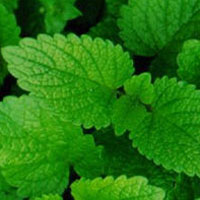Search Healthnotes
Lemon Balm
 © Steven Foster
© Steven FosterParts Used & Where Grown
The lemon balm plant originated in southern Europe and is now found throughout the world. The lemony smell and pretty white flowers of the plant have led to its widespread cultivation in gardens. The leaves, stems, and flowers of lemon balm are used medicinally.
- Reliable and relatively consistent scientific data showing a substantial health benefit.
- Contradictory, insufficient, or preliminary studies suggesting a health benefit or minimal health benefit.
- For an herb, supported by traditional use but minimal or no scientific evidence. For a supplement, little scientific support.
Our proprietary “Star-Rating” system was developed to help you easily understand the amount of scientific support behind each supplement in relation to a specific health condition. While there is no way to predict whether a vitamin, mineral, or herb will successfully treat or prevent associated health conditions, our unique ratings tell you how well these supplements are understood by the medical community, and whether studies have found them to be effective for other people.
For over a decade, our team has combed through thousands of research articles published in reputable journals. To help you make educated decisions, and to better understand controversial or confusing supplements, our medical experts have digested the science into these three easy-to-follow ratings. We hope this provides you with a helpful resource to make informed decisions towards your health and well-being.
This supplement has been used in connection with the following health conditions:
| Used for | Amount | Why |
|---|---|---|
Cold Sores | Apply a 1% 70:1 herbal extract four times per day | Lemon balm, with its antiviral properties, appears to speed the healing of cold sores and reduce symptoms when applied topically as a cream. |
Alzheimer’s Disease | 60 drops per day of a 1:1 herbal tincture, standardized to contain at least 500 mcg per ml of citral | Supplementing with an herbal extract of lemon balm (Melissa officinalis) has been shown to improve cognitive function and reduce agitation in people with Alzheimer's disease.
|
Colic (Chamomile, Fennel, Licorice, Vervain) | 1/2 cup (118 ml) of tea up to three times daily | A soothing tea made from chamomile, vervain, licorice, fennel, and lemon balm has been shown to relieve colic more effectively than placebo. |
Genital Herpes | Apply a cream containing 1% of a standardized 70:1 extract four to five times per day | One study found that topical application of a cream containing a highly concentrated extract of lemon balm helped heal oral and genital herpes sores faster than a placebo. |
Hyperthyroidism | Refer to label instructions | Test tube studies have found that lemon balm blocks attachment of antibodies to the thyroid cells that cause Grave’s disease (hyperthyroidism), though clinical trials proving lemon balm’s effectiveness as a treatment are lacking. |
Indigestion, Heartburn, and Low Stomach Acidity | Refer to label instructions | Lemon balm is a gas-relieving herb that is used traditionally for indigestion. |
Infection | Refer to label instructions | Lemon balm is an antiviral and antimicrobial herb. |
Insomnia | Refer to label instructions | Studies have found a combination of valerian and lemon balm to be effective at improving sleep. |
Nerve Pain | Refer to label instructions | Traditionally, topical applications to the temples were sometimes used by herbalists for insomnia or nerve pain. |
Traditional Use (May Not Be Supported by Scientific Studies)
Charlemagne once ordered lemon balm planted in every monastery garden because of its beauty.1 It has been used traditionally by herbalists to treat gas, sleeping difficulties, and heart problems. In addition, topical applications to the temples were sometimes used by herbalists for insomnia or nerve pain.
Copyright © 2024 TraceGains, Inc. All rights reserved.
Learn more about TraceGains, the company.
The information presented by TraceGains is for informational purposes only. It is based on scientific studies (human, animal, or in vitro), clinical experience, or traditional usage as cited in each article. The results reported may not necessarily occur in all individuals. Self-treatment is not recommended for life-threatening conditions that require medical treatment under a doctor's care. For many of the conditions discussed, treatment with prescription or over the counter medication is also available. Consult your doctor, practitioner, and/or pharmacist for any health problem and before using any supplements or before making any changes in prescribed medications. Information expires December 2024.











